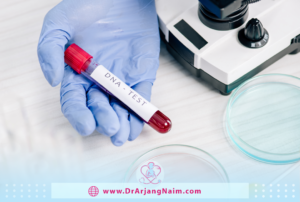Genetic testing can detect chromosomal abnormalities, such as Down syndrome, and individual diseases caused by gene mutations, such as Tay-Sachs disease. It is usually classified as a screening or diagnostic test.
Screening tests are recommended for the general population who are thought to be at moderate or low risk. These tests are noninvasive and carry no risks. They determine whether you are at a lower or higher risk for a particular disease than expected.
Screening tests cannot provide a definitive answer about whether your baby will have a specific disorder or birth defect. The results of a screening test have the chance of being falsely positive or falsely negative.
Types of prenatal screening tests
Screening tests do not diagnose genetic diseases; an abnormal result does not mean the baby will have the disease. It means that the risk of a genetic disorder is higher. Your healthcare provider can help interpret the results of genetic screening tests and explain the next steps.
Carrier screening
Carrier screening is a blood test that your prenatal care provider may recommend for you and your partner. This type of test can identify small gene changes that increase the risk of your baby developing a serious medical condition. These are often called single-gene conditions. Examples include cystic fibrosis, sickle cell disease, and spinal muscular atrophy. If the blood test shows that you are a carrier of the genetic risk, your partner should also be screened. If both parents are carriers of the same genetic risk, the baby may have a more severe form of the condition.
Screening for an abnormal chromosome number
Chromosomes must be inherited in pairs (half a pair from each parent). Sometimes, nature makes a mistake during conception, resulting in missing or extra parts of a chromosome pair. Examples include Down syndrome and Turner syndrome.
Cell-free fetal DNA screening
This test is commonly known as noninvasive prenatal testing (NIPT). Providers look for common abnormal chromosome numbers in small pieces of fetal DNA found in the blood. Because fetal DNA is present in very small amounts, healthcare providers cannot perform this test until about ten weeks into pregnancy.

Serum screening
This type of test is also done on a blood sample. It does not look directly at the fetal DNA. Instead, these tests analyze the levels of different proteins in the blood to determine the risk of having an abnormal number of chromosomes. Examples of this type of test include sequential screening, quadruple screening, and first-trimester serum screening. Each test must be done at specific times during pregnancy, so talk to your provider about which test is right for you.
Screening for physical abnormalities
Sometimes, the presence of extra or missing chromosomes causes changes in the baby’s physical structure. For example, the chromosomes may be normal, but the baby may have a physical defect.
During pregnancy, ultrasounds and blood tests can help determine the risk of physical abnormalities in the fetus and assess whether they may be due to genetic abnormalities.
Nuchal translucency
Providers use ultrasound to measure the thickness of the back of the baby’s neck. The thickness of the nuchal translucency gives clues about the risk of abnormal chromosome numbers and physical abnormalities, such as an abnormally formed fetal heart. Providers do this ultrasound scan between weeks 11 and 14 of pregnancy.
AFP screening (maternal serum screening)
Your provider takes a blood sample to measure the level of AFP. High levels may indicate physical problems in the fetus’s abdomen, face, or spine. This occurs between weeks 15 and 22 of pregnancy.
Quadruple screening
Measures the levels of four substances in the blood and determines the fetus’s risk of chromosomal abnormalities and neural tube defects. This test, also called the multiple marker screen, is done between weeks 15 and 22 of pregnancy.
Fetal anatomy scan
Ultrasound evaluates the fetus’s physical structures, including the developing brain, skeleton, kidneys, heart, abdomen, face, arms, and legs. It is usually performed between the 18th and 20th weeks of pregnancy.

How is an ultrasound done?
Two types of ultrasounds are done during pregnancy:
- Abdominal ultrasound: The gel is applied to the abdomen in an abdominal ultrasound. The ultrasound transducer rotates to create an image on the gel.
- Transvaginal ultrasound: In a transvaginal ultrasound, a smaller ultrasound transducer is inserted into the vagina and placed behind the vagina to create an image. Transvaginal ultrasound creates a clearer image than an abdominal ultrasound and is often used early in pregnancy.
What types of prenatal diagnostic tests are available?
Prenatal diagnostic tests can confirm whether a fetus has a genetic condition. These tests take cells from the amniotic fluid or placenta and test them for specific disorders.
Diagnostic testing is done only if a screening test is abnormal or if you are at high risk of having a baby with a genetic condition. The most common diagnostic tests are amniocentesis and chorionic villus sampling (CVS).
Amniocentesis
The doctor inserts a needle through the skin into the uterus to remove a sample of amniotic fluid from the amniotic sac. Amniocentesis is done between weeks 16 and 20 of pregnancy.
CVS
The provider inserts a needle into the uterus to remove a small sample of cells from the placenta. The provider determines whether it is safer to insert the needle through the abdomen or vagina. CVS occurs around weeks 11 to 13 of pregnancy.
The provider then sends the samples to a laboratory for analysis. The laboratory can perform several diagnostic tests, including fluorescence in situ hybridization (FISH), standard karyotyping, and microarrays or specialty panels. Some diagnostic test results can be ready in 72 hours, while others may take more than two weeks.

Who should get genetic testing?
Deciding to have prenatal genetic testing is a personal choice. The results provide important information about the health of the fetus.
Healthcare providers offer genetic screening to all pregnant families as part of prenatal care. Some of the reasons families choose diagnostic genetic testing during pregnancy include:
- An abnormal result from a genetic screening test.
- A family or personal history of genetic conditions.
- Pregnancy over age 35.
- A history of miscarriage or stillbirth.
The bottom line
Prenatal genetic testing involves screening and diagnostic tests to assess the health of a developing fetus. Screening tests, like cell-free fetal DNA testing, carrier screening, and ultrasound, identify potential risks but don’t confirm diagnoses. Diagnostic tests like amniocentesis and CVS analyze fetal cells to confirm genetic conditions. Decisions about prenatal genetic testing are personal and should be discussed with your healthcare provider.
Additional questions
- What screenings are done in the first trimester?
First-trimester screening is a combination of tests offered to pregnant women to assess the risk of their baby having specific congenital disabilities, primarily chromosomal abnormalities like Down syndrome. It typically includes a maternal blood test and an ultrasound exam. An abnormal screening result does not confirm a diagnosis but rather indicates an increased risk, prompting further diagnostic testing is recommended.
- Are there any risks to genetic testing during pregnancy?
Some prenatal genetic tests, such as amniocentesis and CVS, carry a small risk of miscarriage. Other potential risks include infection at the puncture site and premature rupture of membranes. These risks are generally low, but discussing them thoroughly with your healthcare provider before deciding about prenatal genetic testing is crucial.
- What is the difference between genetic screening in pregnancy and carrier screening?
Carrier screening checks if parents carry genes for specific conditions, while genetic screening in pregnancy assesses the risk of the fetus having those conditions. Carrier screening is typically done before or early in pregnancy, focusing on the parents’ genetic makeup. Genetic screening occurs during pregnancy, analyzing the fetus for potential issues.
- What is the most common prenatal test?
The most common prenatal test is ultrasound.
- What are the signs of an unhealthy baby in the womb?
- Decreased or absent fetal movement
- Vaginal bleeding or spotting
- Leaking of fluid
- Severe abdominal pain or cramping
- Fever or chills
- Swelling, especially in the face and hands
- Headaches, blurred vision, or changes in vision
Reference
https://my.clevelandclinic.org/health/diagnostics/24136-pregnancy-genetic-testing
https://www.hopkinsmedicine.org/health/wellness-and-prevention/common-tests-during-pregnancy
https://www.webmd.com/baby/pregnant-genetic-testing
https://www.pregnancybirthbaby.org.au/prenatal-screening-overview




